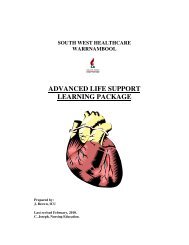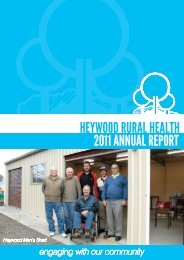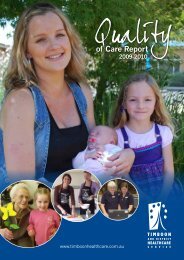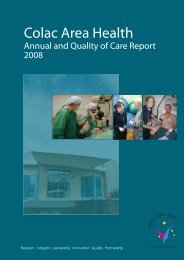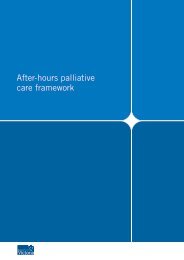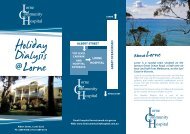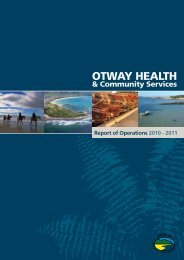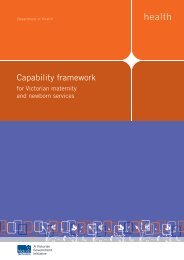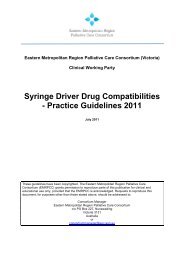Self Directed Learning Package - University of Queensland
Self Directed Learning Package - University of Queensland
Self Directed Learning Package - University of Queensland
- No tags were found...
You also want an ePaper? Increase the reach of your titles
YUMPU automatically turns print PDFs into web optimized ePapers that Google loves.
155 • <strong>Self</strong> <strong>Directed</strong> <strong>Learning</strong> <strong>Package</strong> - CareworkerFamily members <strong>of</strong>ten spend many hours with the resident atthis time. They may share with you their sadness and grief. Theymay ask you questions about what is happening.Key PointIt is OK to respond to these questions so longas they are within your scope <strong>of</strong> practice as acareworker. If you are unsure <strong>of</strong> what to say (orthe questions are about nursing or medical issues),reassure the family and tell them you will ask thenurse to come and speak with them.When the resident diesWhen death occurs, the resident stops breathing and theheart stops beating. There will be no response to verbalor physical stimulation. The mouth and eyes may be open(the pupils will be large and fixed on one spot). The residentmay have also lost control <strong>of</strong> their bladder and bowel.<strong>Self</strong>-careKey PointNo one ever complained that someone cried; butthey have complained that no one seemed to care.Close relationships can develop between careworkers andresidents. It is important to be aware that when a resident dies,you may grieve as well. You are not expected to be a robot, andit is possible that you may feel sad, angry, upset, confused, guiltyor even relieved at this time. Feelings <strong>of</strong> grief are different foreveryone and are a normal reaction to a loss.The following suggestions may assist you with your grief:• ask the family’s permission to attend the funeral• talk to your supervisor or colleagues about how you arefeeling• seek support from a pr<strong>of</strong>essional counsellor.If you are the first person to find a resident who has died,immediately notify a nurse. They will contact the doctor whowill need to legally certify that the resident has died.Grief and lossReminisce with family and friends <strong>of</strong> the deceased resident ifyou feel comfortable to do so. It shows you saw the resident asan individual, not just “another resident”.Acknowledge the grief <strong>of</strong> those around you. If family membersare visibly upset, you can say ‘It must be hard for you; it is adifficult time…’ Showing family members you are upset e.g.crying is all right.SUCCESS!You have completed Section 2 <strong>of</strong> the learning package.Please go on with the quiz.



